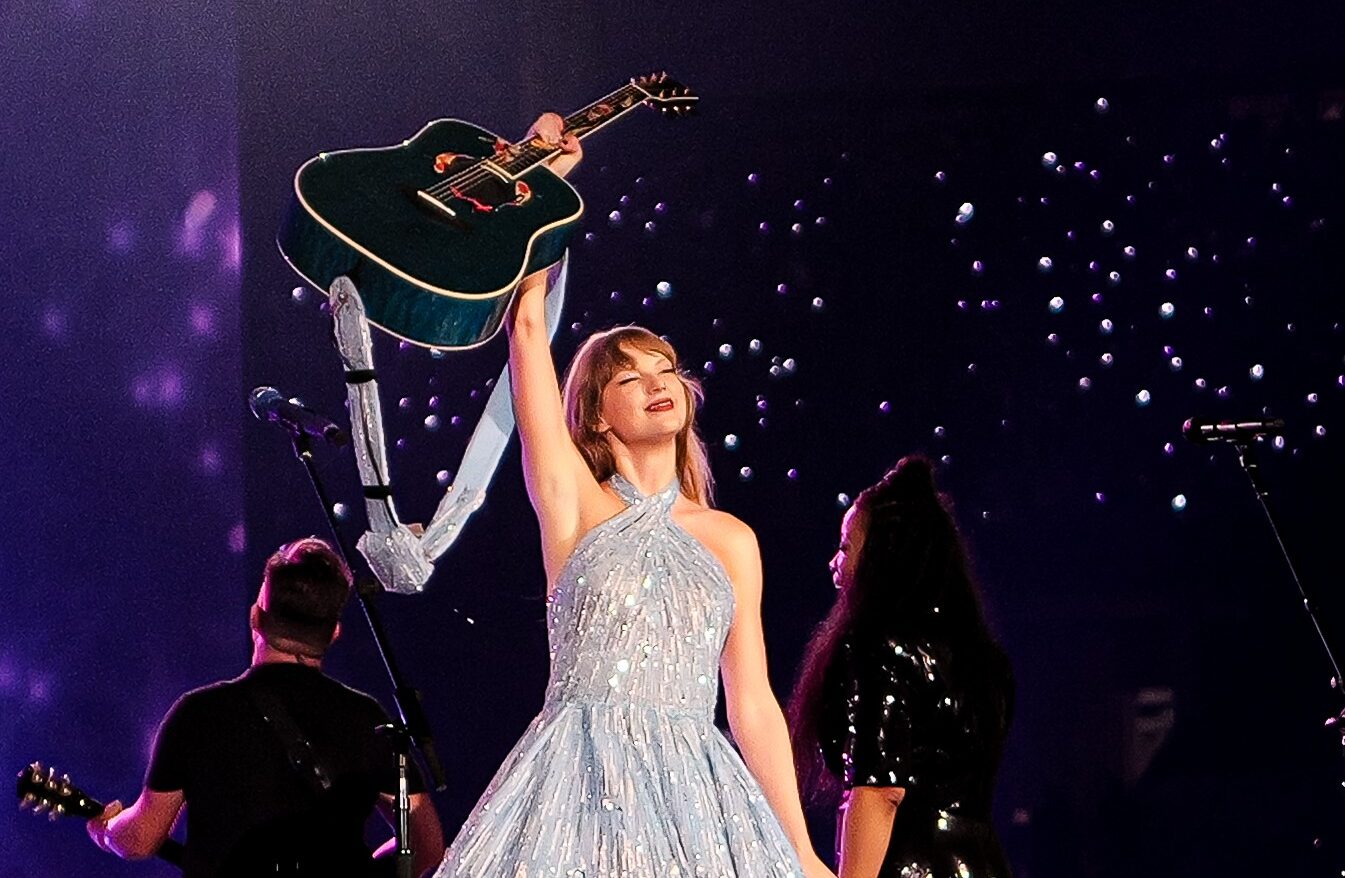
Like any devoted pop music fan active on social media, I have been closely following Taylor Swift’s Eras Tour. From the unexpected album releases, celebrity cameos, and, of course, her jaw-dropping performances, the songstress seems to have captivated the world with her artistry. However, what has truly caught my attention is Swift’s newfound engagement in the political sphere. As her career unfolds, transcending the boundaries of a conventional pop spectacle, it is impossible to ignore the evolution of the artist beyond her musical prowess. In the ever-evolving landscape of pop culture, where artists often tiptoe around political discussions, Taylor Swift has emerged as a trailblazer, shifting from crafting love ballads to actively participating in social and political conversations. Swift’s ability to seamlessly weave her political beliefs into the fabric of her public identity raises compelling questions about the role of artists in shaping public discourse.
For years, Taylor Swift meticulously curated an apolitical image, focusing on her musical achievements and creating a space where her fans could escape the complexities of the world. Although the turning point came in October 2018, when Swift, known for her guarded silence on political matters, broke free from her cocoon and endorsed two Democratic senators in the US midterm elections through a carefully crafted Instagram post, it marked a departure from the conventional trajectory of her career. The artist, once hailed as the “Aryan goddess” by the alt-right movement due to her seemingly neutral image, shattered the expectations surrounding her political stance, triggering a media storm, with headlines claiming that Swift speaking out has been a “betrayal beyond worlds.” On Instagram, the pop star revealed that she planned to support Tennessee’s Democrats in the forthcoming midterm election, endorsing Phil Bredesen for the Senate and Jim Cooper for the House of Representatives. “I’ve been reluctant to publicly voice my opinions, but due to several events in my life, I feel very differently now,” the songstress wrote in a heartfelt Instagram post, explaining her decision to speak out. “I cannot vote for someone who will not be willing to fight for the dignity of ALL Americans, no matter their skin, colour, gender, or who they love… Please, please educate yourself on the candidates running in your state and vote on who most closely represents your beliefs.” Swift’s endorsement of Democratic candidates was met with both support and backlash. Fans who admired Swift for keeping her political views private, applauded the singer for taking a stand, while others accused her of betraying her apolitical stance and labelled her a traitor to the ideals that they believe she represented.
In 2020, Taylor Swift continued to use her music as a powerful instrument for social and political commentary with the release of ‘Only the Young’. This song, featured in the documentary ‘Miss Americana’, showcased Swift’s evolving commitment to activism and her desire to mobilise her fanbase towards civic engagement. The lyrics ‘the big bad man’ whose ‘hands are stained with red’ were a direct commentary on the Trump administration’s policies and actions, reflecting on the artist’s concern for the state of the nation, acting as a running commentary on issues such as rigged elections and mass shootings. The accompanying visuals in the music video depicted scenes of political activism, protests, and a call for unity among the youth. Swift became a symbol of political engagement, urging her fans not only to listen but to act, to register, and to vote.
Taylor Swift has also been an outspoken advocate for LGBTQ+ rights and gender equality, using her platform to champion inclusivity and support. The release of ‘You Need to Calm Down Music’ in 2019 showcased Swift’s dedication to using her influence to address discrimination and promote a more united society. The song not only celebrated the vibrancy of the LGBTQ+ community but also delivered a powerful message against hate and prejudice. The accompanying music video was a visual spectacle featuring a star-studded cast of LGBT+ celebrities, amplifying a message of acceptance. Beyond the music, Swift actively engaged in political conversations to advance LGBT+ rights, with her advocacy endorsing the Equality Act, a landmark piece of legislation that seeks to protect LGBT+ individuals from discrimination. The songstress used her social media platforms to encourage her fanbase to educate themselves about the Equality Act, while during Pride Month, she asked her fans to show their pride ‘by demanding that, on a national level, [their] laws truly treat [their] citizens equally’. Through leveraging her influence, Swift transformed her support for LGBTQ+ rights into a call to action, urging her fans to join her in the fight for equality.
Yet Swift’s political affluence started much earlier than her explicit political activism. Swift’s sexual assault case against DJ David Mueller in 2017 made a significant mark on the #MeToo movement, contributing to the growing discourse surrounding sexual harassment and assault. Swift’s decision to countersue Mueller for a symbolic $1, rather than seeking financial gain, underscored her commitment to holding her abuser accountable and seeking justice beyond monetary compensation. The trial unfolded at a crucial juncture when the #MeToo movement was gaining momentum, exposing the pervasive nature of sexual misconduct across various industries. By openly sharing her own experience, she became a symbol of strength for survivors around the world, sparking a broader conversation about the prevalence of sexual harassment and the importance of breaking the silence that often surrounds it. Swift’s willingness to confront her abuser in a public forum sent a resounding message that no one, regardless of their stature, is immune from accountability. The outcome of the trial, in which Swift emerged victorious, served as a symbolic victory for survivors of sexual assault. The verdict reinforced the idea that survivors could come forward, share their stories, and find justice. Swift’s case became a rallying point within the #MeToo movement, showcasing the power of speaking out and taking legal action against perpetrators.
Why is all of this so crucial? Swift’s evolution from a love ballad maestro to a prominent advocate in political, social, and equality dialogues challenges the norms of pop culture, spotlighting the significant influence artists wield in shaping not just artistic preferences but societal outlooks. This pivotal change gains added weight in a time when social and political matters are intricately intertwined with popular culture, transforming fans’ expectations of artists from mere entertainers to inspirational guides. Swift’s expanded role redefines the artist’s responsibilities as cultural influencers, emphasising their potential to mould a more inclusive and knowledgeable society. As she embraces this broader role, Swift transcends being solely a musical powerhouse, emerging as a symbol of empowerment and inspiring her audience to actively engage in the ongoing conversations that mould our world. In an era where the boundaries between entertainment and activism blur, Taylor Swift’s transformation into a catalyst for change stands as a poignant testament to artists as architects of a new cultural paradigm, their voices resonating far beyond melody, connecting with the aspirations of a generation craving both art and advocacy.
Image: Taylor Swift The Eras Tour: Speak Now Set Era, Paulo Villanueva, 2023 // CC BY 2.0 DEED



Average Rating